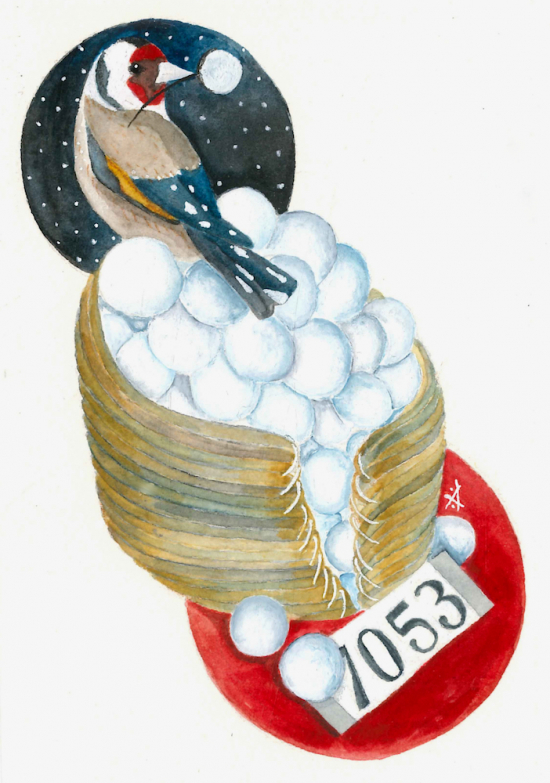I raise my hand as I see the bus for Cleveland Avenue coming. I have been waiting for twenty minutes, freezing, my feet painfully cold. It’s the first of December and the city has been covered by the first snow. I don’t think the lake will freeze over, it hasn’t happened since World War II, almost 20 years ago. I wouldn’t even know where to look for my skates, eventually.
I take a seat on the first row behind the line, at the window. The bus is almost full, and the window pane is clouded, so I rub it with my jacket sleeve to look out while we lazily proceed on the street. With the first snow of the season, Montgomery always plunges in a pocket-size chaos: people shovelling away snow from their front steps, the snowplough pushing it on the pavement again, and the poor snow that goes from one side of the road to the other, getting dirty and acquiring that brown-greyish colour that makes it so ugly.
And despite it all, Montgomery is beautiful at Christmas, it might even have more lights than Atlanta, colourful lights hanging across the streetlamps on the Highland Avenue and almost everywhere in Centennial Hill. Going south from the Garden District, the houses are adorned with loud decorations on the trees and small nativity scenes in the gardens.
-Get up, nigger, that seat is for the whites – I hear the driver’s voice.
I look at the line that divides the bus seats destined to black people from those of the whites, but I did not make a mistake: I’m sitting behind the line.
-I’m sorry, I didn’t hear you – I answer, playing dumb.
-You’ve heard me all right nigger. Get up!
With his hat, his leather jacket and his clumsily-knotted tie, perhaps the driver pretends to be an air force tenant flying a Mustang P-51 instead of a bus driver in Montgomery, Alabama. Behind my shoulders, I hear the muttered complaints of a reasonable number of black people seated behind the line with me.
I stare at the driver looking down at me, hands on his hips and an expression of disgust mixed with superiority on his face, and my grandpa Jack comes to my mind, he’s on the ground, moaning with pain, his shinbone broken in a cotton field of Elmore. Julius Wallace, his supervisor, had said:
-Get up, you bloody nigger, and pick that cotton!
Three times Jack had tried to get up, and three times he had collapsed, screaming so loudly they could hear him from the other side of the plantation.
-I can’t, mister Wallace, something is broken!
-Bloody slacker, I’ll be the one to break your bones, nigger! – he kept saying, whipping him with a twig like a mule.
-I apologise, sir, but I stay where I am. I’ve had enough.
-What did you say woman? Are you crazy?
-No, sir, I’m not crazy. I’ve just said that I have no plans to give up my seat – I notice that, despite the cold weather, my hands and forehead are sweating. I try to hide my nerves by talking slowly.
The blows inflicted on Jack were atrocious, but what hurt him the most was the injustice, as he explained to me before dying. When the farmer Smith arrived, he started roaring against Wallace, until he stopped beating Jack; the supervisor stared at him as if he had just woken up from a dream. My grandpa Jack whined like a child, on the ground, with his shirt torn to shreds and a bleeding shoulder.
-You damned idiot! Look at that! – the farmer Smith said, lifting Jack’s trousers leg. – Can’t you see it’s broken? The bone is sticking out, it’s a compound fracture! He won’t be able to work for months… and you just added to it! But I’ll speak with Mrs. Torrence, it doesn’t end here – he stated.
-For God’s sake, William! He’s just a beast!
Although Abraham Lincoln had abolished slavery in the United States twenty years earlier, according to Jack the situation in Alabama’s plantations had not changed much. “We were free to carry our misery to another place”, said grandpa about those years.
-If you don’t get up immediately, I’ll get you arrested, you must give your seat to the whites! – I think my forced calm is making the driver angry.
-As my grandfather Jack said, when you’re on the right side, you shall not fear. I will not get up, sir.
I imagine the driver without his jacket and his hat, wearing a striped shirt with rolled-up sleeves and suspenders tied to his trousers, while he threatens me, sweating, with a rod in his hand:
-You’re testing my patience! Can’t you read? Don’t you know the rules?
-Sir, I know well enough the unfair norms that govern us. I can read, I’m a teacher. I apologise for my stubbornness, but I will not get up.
Grandpa Jack never walked like he used to again. I remember him with a cane, limping as if he had a shorter leg. This did not prevent him from continuing to pick cotton up to his seventies. My grandma Martha said that episode had changed him. Not physically. It had killed his joy: he did not sing like a bird anymore, as she used to say.
-Enough! Now I’ll call the police from the transceiver! – he’s so enraged that spit flies from his mouth with each word.
I take off my glasses and clean the driver Wallace’s saliva with my scarf, while saying:
-Do what you have to do. I’ll wait here.
Less than five minutes later, the police siren echoes in the street. The car stops right in front of the bus, and two policemen, wearing a jacket, tie and hat, get down. The guns and truncheons are hanging from their belts, but they walk slowly towards me, they do not look angry. When they stand in front of me, all the blacks on the bus are on their feet, tense and stiff, while the whites, getting up as well, have scrammed away from the scene, squeezing themselves near the driver’s seat.
-Please, Madam, leave your seat – says the young one, an extremely white and handsome man, who tried to hide a smile while talking to me. I almost blush.
-I apologise, agents, but I’ve already told the driver that I will not get up.
-Do you know that in that case we will be forced to arrest you for disturbance of public order? – asks the old one, who wears a moustache and is more serious, although his movements are deliberate.
-You should do your duty. And I should do mine.
-We have no choice, Madam – says the policeman with the moustache, taking out the cuffs from behind his back.
They say that the farmer Smith whipped Julius Wallace for what he did to my grandpa Jack. Nobody knows if it’s true, the fact is that Julius disappeared from the plantation for a while and when he came back he never beat a black again. He looked at them with profound hate and resentment, his lips tight, but he never beat anyone again. My grandpa always told me that the farmer Smith was a good man, that he couldn’t hurt a fly.
They lead me to their car under the vigil and triumphant stare of the driver Wallace, who, with crossed arms, thinks he has won the battle. But from the back of the bus, where the blacks usually sit, a concert of whistles starts, and in the street a crowd has formed around the two vehicles, asking what happened:
-She refused to give her seat to a white – says one.
-She said she was tired – answers another.
-No, she said she’d had enough, not that she was tired – counters another from ahead of them.
-Officer, let her go, it’s unfair! – they shout from the back.
An old man, well-dressed and white, goes by shaking his head without stopping:
-It’s a real shame… sooner or later something awful will happen. This is insane.
-We need people like you, with no prejudices. Why don’t you apply for the governor position? – says a big black man with a jacket, scarf and baseball hat, clapping him on the shoulder.
Right when my car door closes, the cute policeman turns my way with a sad expression, admitting that he cannot avoid doing his job. We leave at top speed, directed to the police station.
Upon our arrival, the rumour has not spread yet. They take my fingerprints and my photograph with the number 7053, then they lead me to the questioning room. A fat and sweaty man with sparse dark hair appears, he’s wearing a double-breasted coat, black tie and white shirt with a small sauce stain.
-Mrs. Parks, I’m chief Lovell.
-Nice to meet you, chief. – I answer, holding out my hand; he looks at it, then decides to take it, against his will.
Jack told me, before dying, that a few years after his retirement he had met the farmer Smith as he was walking in Elmore streets. They went drinking bourbon together. He did not confess that he had whipped Julius Wallace, but he told him that the day when that savage had beaten my grandpa, he had cried like he had never cried before, swearing to himself that he would have never allowed the blacks to be abused again. My grandpa used to say that the farmer Smith was a good man.
-I have one question, since evidence is set, and we have so many witnesses. Why did you do that?
-And why do you keep pushing us from all sides?

